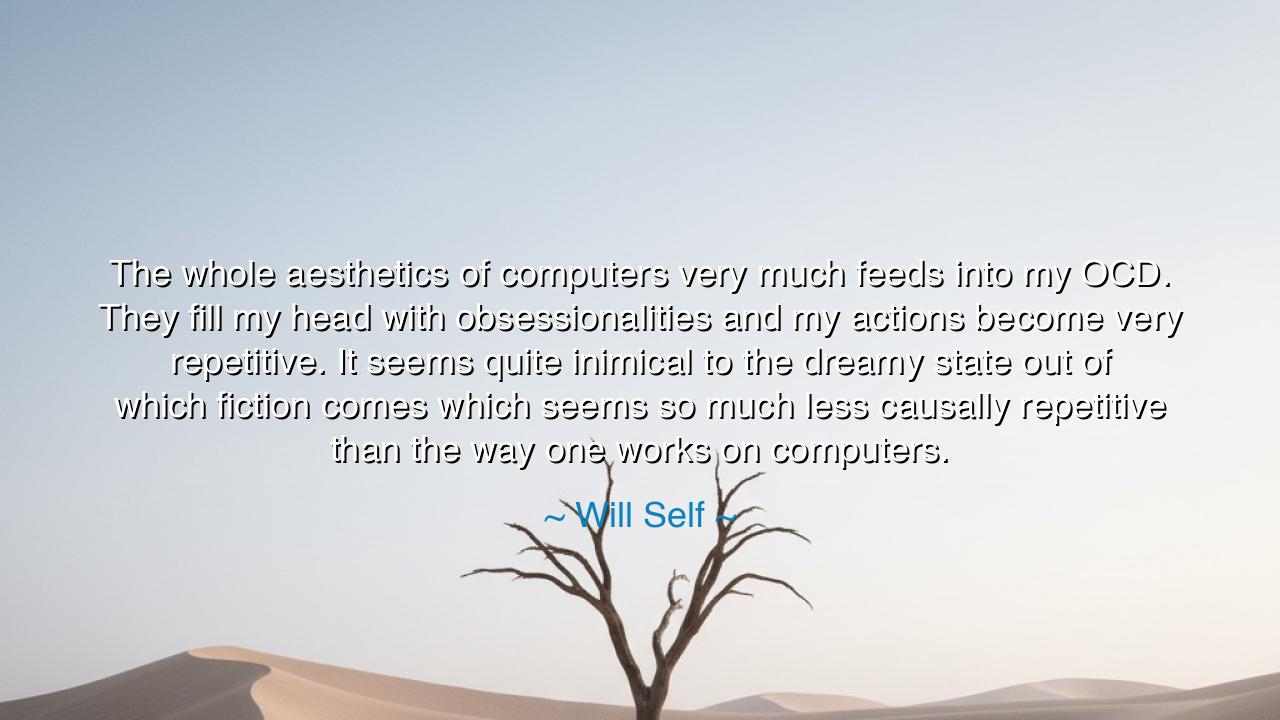
The whole aesthetics of computers very much feeds into my OCD.
The whole aesthetics of computers very much feeds into my OCD. They fill my head with obsessionalities and my actions become very repetitive. It seems quite inimical to the dreamy state out of which fiction comes which seems so much less causally repetitive than the way one works on computers.






The novelist and philosopher of modern unease, Will Self, once spoke with piercing honesty: “The whole aesthetics of computers very much feeds into my OCD. They fill my head with obsessionalities and my actions become very repetitive. It seems quite inimical to the dreamy state out of which fiction comes, which seems so much less causally repetitive than the way one works on computers.” In these words lies not merely a confession of struggle, but a lament for a vanishing world—the world of imagination, of fluid thought, of the wandering mind unbound by machinery. Self speaks as one standing between two realms: the mechanical precision of the computer and the mystical chaos of human creativity. His words remind us that while machines bring order, art is born from disorder—from the soft turbulence of the dreaming soul.
When Self speaks of the “aesthetics of computers,” he refers not only to their form but to their spirit—the way they shape our habits, thoughts, and even the rhythms of our hands. A computer, for all its elegance, demands repetition: the same keystrokes, the same clicks, the same mechanical routines. It rewards precision but discourages drift. And it is in drift, in the slow meander of unstructured thought, that fiction—the great flowering of imagination—takes root. He finds that the rigid clarity of the digital world conflicts with the dreamlike, the irrational, the intuitive. For the imagination is like a forest: it grows best in wildness, not under fluorescent light.
Self’s words spring from his own obsessive-compulsive disorder (OCD), a condition that magnifies repetition and control until they consume the mind. Yet even those without his condition can feel the truth of his struggle. For the digital age itself has made all of us a little obsessive—checking, scrolling, refreshing, repeating. The repetition of machines seeps into our consciousness, drawing us away from the organic rhythm of thought and life. In this sense, Self speaks not only for himself but for all who feel the tug of technology on the soul. His confession becomes a mirror for the modern condition.
The ancients, too, warned of the tension between order and inspiration. The philosopher Plato wrote that poets create not through reason, but through divine madness—a kind of holy delirium that transcends logic. In contrast, the mathematicians and engineers of his age sought the perfection of symmetry and form. Between these two forces—chaos and control—civilization has always walked a trembling line. In our time, the computer has become the embodiment of order, of logic perfected. Yet, as Self reminds us, the soul that dreams and writes cannot be measured in circuits or codes. The creative act, like love or prayer, resists repetition; it is born anew each time, unpredictable and sacred.
Consider the story of Ludwig van Beethoven, who, though surrounded by the precise architecture of musical theory, often broke its rules in moments of inspiration. His symphonies are filled with sudden shifts, wild crescendos, and silences that defy structure. Were he to compose in the age of machines, one wonders—would his restless genius survive the tyranny of the tidy digital grid? Beethoven’s greatness lay in his imperfection, his willingness to wander into chaos to find truth. So too does Self suggest that the artist must sometimes step away from the machine’s glow to rediscover the divine disorder from which art is born.
The lesson, then, is both warning and wisdom: beware of the comfort of perfect systems. The human spirit is not made for endless repetition, but for renewal. The writer, the dreamer, the creator—all must guard their inner wilderness, the place where wonder and madness mingle. Let the computer serve you, but never let it master your rhythm. For when the mind becomes mechanical, the heart grows silent.
So, children of the digital age, remember the wisdom of Will Self. Make time to wander, to daydream, to lose yourself in thoughts unrecorded by any machine. Step away from the glow of the screen and walk into the silence where imagination waits. Do not fear imperfection; embrace it, for it is the fingerprint of your humanity. The machine may repeat without error, but only the human soul can create with mystery. Guard that mystery as you would guard your breath, for in it lies the sacred power to dream—to write—to live.
And thus, let his words echo like a bell in the age of algorithms: do not let repetition replace revelation, nor order extinguish awe. For the machine perfects the known, but the artist dares to seek the unknown. It is from that untamed place—neither logical nor linear—that true creation is born, as it has been since the dawn of thought and will be, so long as there are minds that still dare to dream.






AAdministratorAdministrator
Welcome, honored guests. Please leave a comment, we will respond soon